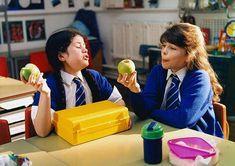
The government has launched a consultation on standards of food sold in schools to tackle the problems of obesity.
The move follows recommendations from the School Food Trust (SFT), which called for a ban on confectionery and snacks.
The Trust has drawn up draft standards to prevent childhood obesity spiraling out of control and to improve children's health.
The government’s consultation will seek the opinion of head teacher and school workforce associations, dieticians, health charities and food and drink organisations on a proposed ban for confectionery and fizzy drinks being sold in schools.
“The independent SFT has proposed a robust standard for food which can be sold in schools through vending machines, tuck shops and at break times,” said schools minister Jacqui Smith.
“It is important that we now seek the views of a wide range of stakeholders on these to ensure that such standards are effective, practical, and in the best interests of children's health.”
The proposed standards have been met with mixed reaction. The Food and Drink Federation said it did not think the standards would help solve the obesity problem. Martin Paterson, deputy director general of the FDF, said: “Banning foods is neither an effective or practical solution to tackling obesity. Balance is the key and bans will not help teach children how to build a balanced diet.”.
Suzi Leather, chair of the SFT, also said that obesity targets “cannot succeed if pupils are surrounded with chocolate, crisps and drinks that fill them up with sugar and fat during the school day”.
After the consultation the government will publish the final version of the non-lunch standards alongside the agreed standards for school lunches in May.
The SFT is calling for the standards to be applied to every food outlet in schools, including breakfast, after-school meals, mid-morning breaks, vending machines and tuck shops.
It recommends the following standards:
• No confectionery should be sold in schools.
• No bagged savoury snacks other than nuts and seeds (without added salt or sugar) should be sold in schools.
• A variety of fruit and vegetables should be available in all school food outlets, which could include fresh, dried, frozen, canned and juiced varieties.
• Children and young people must have easy access at all times to free, fresh, preferably chilled, water in schools so that children do not have to visit the toilet block to get water.
• The only other drinks available should be bottled water (still or sparkling), skimmed or semi-skimmed milk, pure fruit juices, yoghurt and milk drinks (with less than 5% added sugar) or drinks made from a combination of these such as smoothies, tea or coffee.
• Every school should have an integrated whole school food and nutrition policy, preferably reflected in its single School Plan.






No comments yet